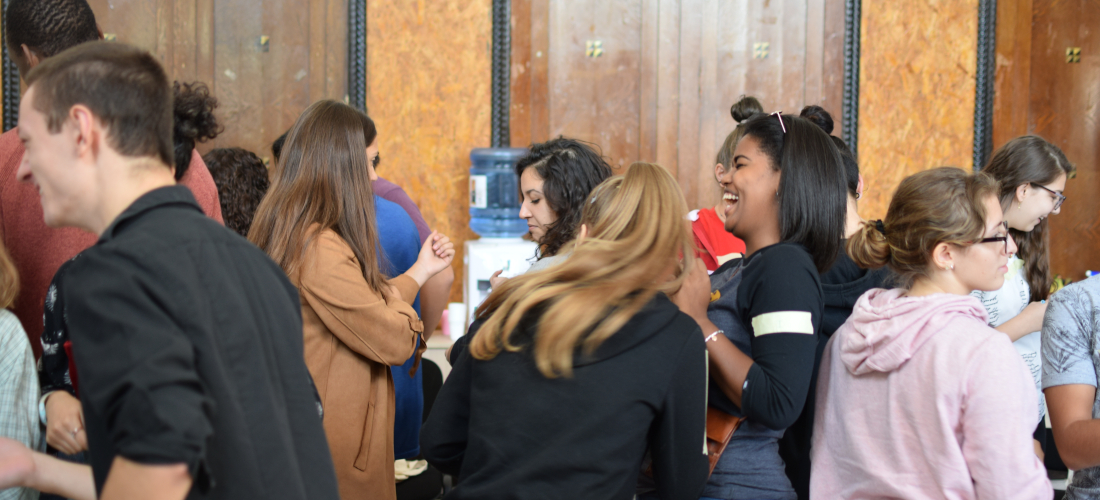What is peer education?
We learn a lot of what we know and who we are throughout our lives from our peers. Peer education is a way of giving an intention to such an important influence. It is a way of influencing our peers' life in a way that is positive.
Peer education rests on the idea that “young people are the experts on their own lives and are therefore the best starting point in any learning process”3. Peer education enables youth to deal effectively with problems that affect them. The process can be partly social; thereby establishing forums for young people to explore new frontiers; helping to solve problems; and letting people in positions of authority gain a better understanding of the point of view of youth.
As obvious as it may sound, the success of peer education initiatives lies first and foremost in one's capability to truly consider youth as equal partners. According to the Domino Manual produced by the Council of Europe:
- Youth are ready-made experts. They have a unique perspective on the issues that affect them and can often “make things happen“.
- As role models to their peer group, youth have the potential to demonstrate effective communication styles and approaches. This may be accomplished through workshops and games, music and mass media, discussion or story telling.
- Where resources are limited and large numbers of people have to be reached, peer group education has a multiplier effect. Such programmes also have an informal cascade effect, creating “buzz“ in a local community.
-
If encouraged and supported, youth can control the process of education and information exchange. Whether or not this occurs depends upon the setting in which a programme is operating. Peer group education can help to foster youth participation in programmes of formal and informal education.4
Where do you find peer education?
Peer education can take place in any setting where young people feel comfortable: in schools and universities, clubs, churches, community centres, workplaces, on the street, on the Internet. It can happen in small groups or just between two people.
Peer education can be as simple and informal as when your friend is teaching you how to use makeup, how to juggle, how to play an instrument, how to fix your radiator… It can also be more “formalised”. Here are some examples of youth peer education activities:
- Within schools: training a group of peer trainers who could raise the awareness of other youngsters on specific topics (for instance by organising a 2h workshop in a classroom, by participating in a thematic week/day in the school, by contributing to an external activity with classmates…)
- Within youth organisations/youth centres: training a group of peer trainers who could organise specific activities for the other members (for instance through workshops, sport, exhibitions, music, drama, street education…)
- Within youth movements: scouts, guides andothers have been using peer education for years. Some of them could be trained on issues they would like to address and discuss with others (for instance how to deal with cultural diversities when organising camps abroad...)
- Within institutions for young offenders: training a group of peer trainers who could support newcomers (for instance by negotiating the ground rules, by raising awareness on stereotypes, by being more aware of their rights and responsibilities as citizens…)
- Within the media: training young journalists on how to support and mentor colleagues in dealing with sensitive issues, on how to use specific techniques and materials
- Within political groups, within a group of volunteers, within a community centre, within a healthcare institution, within a group of students, in your neighbourhood, with your friends and family, with your fitness club…
1 SALTO Youth Cultural Diversity Resource Centre. PEERing In PEERing Out: Peer Education Approach in Cultural Diversity Projects.
2 Adapted from United Nations Population Fund and Youth Peer Education Network (2005). Youth Peer Education Toolkit. Training of Trainers Manual, New York (USA).
3 SALTO Youth Cultural Diversity Resource Centre. PEERing In PEERing Out: Peer Education Approach in Cultural Diversity Projects.
4 Council of Europe (1996). DOmino. A manual to use peer group education as a means to fight racism, xenophobia, anti-semitism and intolerance.










 The content on this website is licensed under a
The content on this website is licensed under a